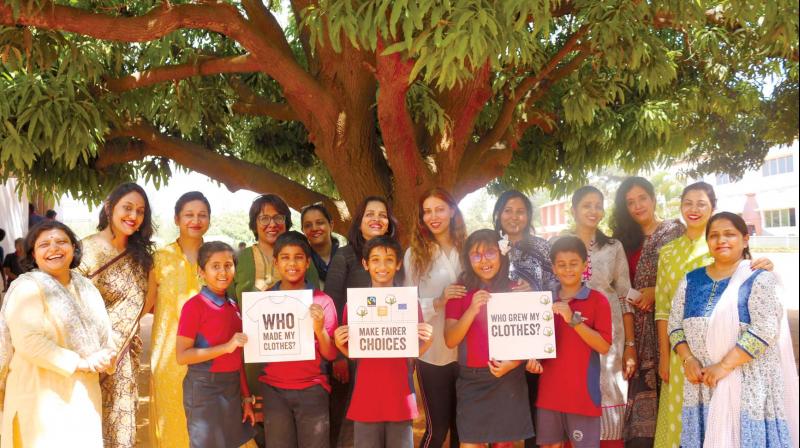As Fair as it can get!

We very often take life for granted and forget to appreciate a lot of things. To begin with, we focus more on the brands that we buy rather than how our clothes are actually manufactured.
Reports say that fashion is stated as the second most corrupt industry. Involving certain exploitive measures while fashion and its fabrics are dealing with its own profits, the farmers who are the main producers of these fabrics are committing suicide due to poverty. To make the consumers know their producers and empower them, Fairtrade joined hands with Vidyashilp School in Hebbal. This 25-year-old global movement keeps a check on the standards of the product and certify the liable ones.
Abhishek, CEO of the Fairtrade India says “Consumers are allowed to make their own choice.
They are also supposed to be aware of the makers who are working in an unhealthy atmosphere.
The production here empowers the farmers, avoids child labour, increases economic sustainability, maintains standards; use less percentage of chemicals and pesticides, not completely organic but surely less toxic.”
Fashion Revolution is observed on 24th April of every year in remembrance of Dhaka incident in Bangladesh. Due to the collapse of Rana Plaza complex factory six year ago, 1,133 garment factory workers were killed and over 2,500 were injured. The production in such exploitative conditions caused the deaths in huge number. Vidyashilp School on this day asked people to wear their clothes and ask their favourite brand this important question #WhoMadeMyClothes and #WhoMadeMyClothes. This year it was taken up by 2500 students from Vidyashilp School.
Kalai Selvi, the head of the school says “Students are the ambassadors for tomorrow’s future and their initiative leads to a great change. Being aware helps in minimising the risk, credentials to the right one and no pave to exploitation of farmers or their wages. Education helps in connecting and the active students not only in the school but took lead in spreading in and around their surroundings and communities.”
Aymen Ahmed, 7th grader and member of steering committee says he is proud to interact with the farmers in live and know about them with the help of Fair trade. Aymen adds “I got to see their smiles and hard work behind the production. Being a consumer, it is good to know your producer of daily essentials. I also mention the society to look about it and know about it. Be a part of the wellness and spread as much as you can.”
Vivana Amrolia, 11th grader and member of steering committee says “this useful campaigning is for a cause and we want society to recognise it and be reason for the change. This has mutual benefits. For the customers it is the right choice and right price with healthy material and for the farmers it is the right wages and prices. Citizens must really be aware for the reasons farmer suicides in this agricultural country and I feel we are doing a part by asking who made this?”
Shantanu Garg, 11th standard student and a member of the steering committee so excitingly shared “these are the set of objectives we spread awareness on. The consumers must know the makers behind their choices and also have the right to question their brands. The ethical ways of production of fabrics by the farmers must not be in an exploitive way. We want to do our bit to the society by promoting those brands which do not involve such sort of steps.”
Their live interaction with the farmers from Gujarat, the producers of the uniforms, helps them understand the depth of production and its process included. Four students from the steering committee of the school will be going to Germany to observe the production process in the country and visit schools to understand their knowledge on farmers and consuming brands.

